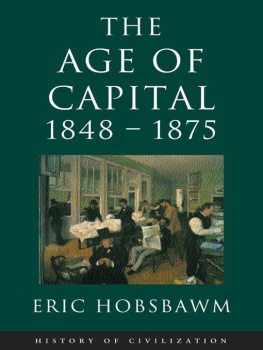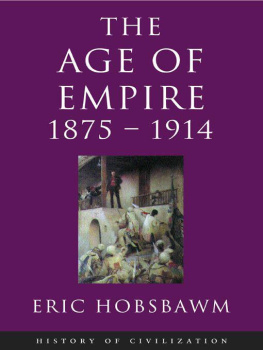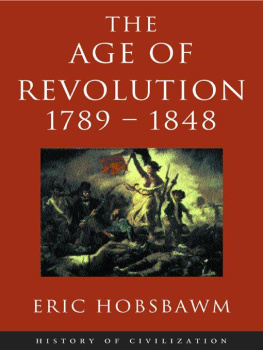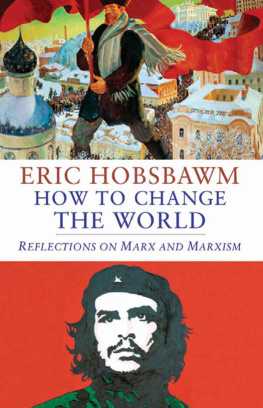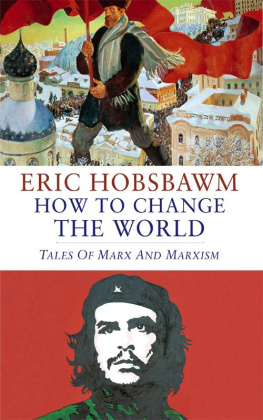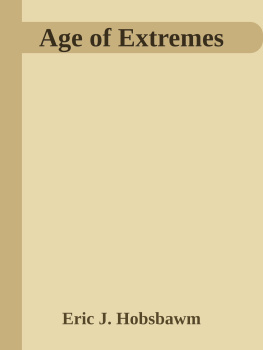Eric Hobsbawm - The Age of Capital: 1848-1875
Here you can read online Eric Hobsbawm - The Age of Capital: 1848-1875 full text of the book (entire story) in english for free. Download pdf and epub, get meaning, cover and reviews about this ebook. year: 1996, publisher: Vintage, genre: Politics. Description of the work, (preface) as well as reviews are available. Best literature library LitArk.com created for fans of good reading and offers a wide selection of genres:
Romance novel
Science fiction
Adventure
Detective
Science
History
Home and family
Prose
Art
Politics
Computer
Non-fiction
Religion
Business
Children
Humor
Choose a favorite category and find really read worthwhile books. Enjoy immersion in the world of imagination, feel the emotions of the characters or learn something new for yourself, make an fascinating discovery.
- Book:The Age of Capital: 1848-1875
- Author:
- Publisher:Vintage
- Genre:
- Year:1996
- Rating:4 / 5
- Favourites:Add to favourites
- Your mark:
- 80
- 1
- 2
- 3
- 4
- 5
The Age of Capital: 1848-1875: summary, description and annotation
We offer to read an annotation, description, summary or preface (depends on what the author of the book "The Age of Capital: 1848-1875" wrote himself). If you haven't found the necessary information about the book — write in the comments, we will try to find it.
The Age of Capital: 1848-1875 — read online for free the complete book (whole text) full work
Below is the text of the book, divided by pages. System saving the place of the last page read, allows you to conveniently read the book "The Age of Capital: 1848-1875" online for free, without having to search again every time where you left off. Put a bookmark, and you can go to the page where you finished reading at any time.
Font size:
Interval:
Bookmark:

Eric Hobsbawm was born in Alexandria in 1917 and was educated in Vienna, Berlin, London and Cambridge. A Fellow of the British Academy and the American Academy of Arts and Sciences, with honorary degrees from universities in several countries, he taught until retirement at Birkbeck College, University of London, and since then at the New School for Social Research in New York.
The Age of Empire 18751914 (Phoenix Press)
Age of Extremes 19141991

Though this book is intended to stand on its own, like the other volumes in the History of Civilisation of which it is a part, it happens that the volume which chronologically precedes it in the series has been written by the same author. Consequently The Age of Capital is likely to be read by some who know The Age of Revolution, Europe 17891848 as well as by others who do not. To the former I apologize for including, here and there, material already familiar to them, in order to provide the necessary background information for the latter. I have tried to keep such duplication to a minimum and to make it tolerable by distributing it throughout the text. The book can, I hope, be read independently. Indeed, it ought not to require anything more than an adequate general education, for it is deliberately addressed to the non-expert reader. If historians wish to justify the resources society devotes to their subject, modest though these are, they should not write exclusively for other historians. Still, a very elementary acquaintance with European history will be an advantage. I suppose readers could, at a pinch, manage without any previous knowledge of the fall of the Bastille or the Napoleonic Wars, but such knowledge will help.
The period with which this book deals is comparatively short, but its geographical scope is wide. To write about the world from 1789 to 1848 in terms of Europe indeed almost of Britain and France is not unrealistic. However, since the major theme of the period after 1848 is the extension of the capitalist economy to the entire world, and hence the impossibility of any longer writing a purely European history, it would be absurd to write its history without paying substantial attention to other continents. My treatment is divided into three parts. The 1848 revolutions form a prelude to a section on the main developments of the period. These I discuss in both a continental and, where necessary, global perspective, rather than as a series of self-contained national histories. The chapters are divided by themes rather than chronologically, though the main sub-periods roughly, the quiet but expansionist 1850s, the more turbulent 1860s, the boom and slump of the early 1870s should be clearly discernible. The third part consists of a series of cross-sections through the economy, society and culture of the third quarter of the nineteenth century.
I cannot claim to be an expert on all but tiny parts of the immense subject matter of this book, and have had to rely almost entirely on second- or even third-hand information. But this is unavoidable. An enormous amount has already been written about the nineteenth century and every year adds to the height and bulk of the mountain range of specialist publications which darken the historical sky. As the range of historians interests widens to include practically every aspect of life in which we of the late twentieth century take an interest, the quantity of information which must be absorbed is far too great for even the most encyclopedic and erudite scholar. Even where he or she is aware of it, it must often, in the context of a wide-ranging synthesis, be reduced to a paragraph or two, a line, or a passing mention, or regretfully omitted. And one must necessarily rely, in an increasingly perfunctory manner, on the work of others.
Unfortunately it is impossible to follow the admirable convention by which scholars punctiliously acknowledge their sources, and especially their debts to others, so that nobody but the originators should claim as their own findings made freely available to all. In the first place, I doubt whether I could trace all the suggestions and ideas I have borrowed so freely back to their origin in some book or article, conversation or discussion. I can only ask those whose work I have looted, consciously or not, to forgive my discourtesy. In the second place, even the attempt to do so would overload the book with a quite unsuitable apparatus of learning. For its object is not so much to summarize the known facts, which implies guiding readers to more detailed treatments of the various topics, but rather to draw them together into a general historical synthesis, to make sense of the third quarter of the nineteenth century, and to trace the roots of the present world back to that period, in so far as it is reasonable to do so. However there is a general guide to further reading (see pp. 3339) which includes some of the works I have found most useful and to which I would wish to acknowledge my debt.
References have been almost entirely confined to the sources of quotations, statistical tables and some other figures, and for some statements which are controversial and surprising. Most of the scattered figures taken from standard sources or from such invaluable compendia as Mulhalls Dictionary of Statistics have not been specifically acknowledged. References to works of literature e.g. Russian novels which exist in a variety of editions are to titles only: exact references to the precise edition used by the author, but which may not be the one available to the reader, would be mere pedantry. References to the writings of Marx and Engels, who are major contemporary commentators in this period, are both to the familiar title of the work or date of letter and to the volume and page of the existing standard edition (K. Marx and F. Engels, Werke [East Berlin 195671] hereafter Werke). Place-names have been given in the English form where there is one, otherwise in the form generally used in publications at the time. This implies no nationalist prejudice one way or another. Where necessary the current name is added in brackets, e.g. Laibach (Ljubljana).
Sigurd Zienau and Francis Haskell have been kind enough to correct my chapters on the sciences and arts, and to correct some of my errors; Charles Curwen has answered my questions on China. Nobody is responsible for my mistakes and omissions except myself. W. R. Rodgers, Carmen Claudin and Maria Mois helped me enormously as research assistants at various times. Andrew Hobsbawm and Julia Hobsbawm helped me to select the illustrations, as did Julia Brown. I am also indebted to my editor, Susan Loden.
E. J. Hobsbawm, The Age of Revolution, Europe 17891848 (London 1962).
In the 1860s a new word entered the economic and political vocabulary of the world: capitalism. It therefore seems apposite to call the present volume The Age of Capital, a title which also reminds us that the major work of capitalisms most formidable critic, Karl Marxs Das Kapital (1867), was published in these years. For the global triumph of capitalism is the major theme of history in the decades after 1848. It was the triumph of a society which believed that economic growth rested on competitive private enterprise, on success in buying everything in the cheapest market (including labour) and selling in the dearest. An economy so based, and therefore resting naturally on the sound foundations of a bourgeoisie composed of those whom energy, merit and intelligence had raised to their position and kept there, would it was believed not only create a world of suitably distributed material plenty, but of ever-growing enlightenment, reason and human opportunity, an advance of the sciences and the arts, in brief a world of continuous and accelerating material and moral progress. The few remaining obstacles in the way of the untrammelled development of private enterprise would be swept away. The institutions of the world, or rather of those parts of the world not still debarred by the tyranny of tradition and superstition or by the unfortunate fact of not having white skins (preferably originating in the central and north-western parts of Europe), would gradually approximate to the international model of a territorially defined nation-state with a constitution guaranteeing property and civil rights, elected representative assemblies and governments responsible to them, and, where suitable, a participation in politics of the common people within such limits as would guarantee the bourgeois social order and avoid the risk of its overthrow.
Font size:
Interval:
Bookmark:
Similar books «The Age of Capital: 1848-1875»
Look at similar books to The Age of Capital: 1848-1875. We have selected literature similar in name and meaning in the hope of providing readers with more options to find new, interesting, not yet read works.
Discussion, reviews of the book The Age of Capital: 1848-1875 and just readers' own opinions. Leave your comments, write what you think about the work, its meaning or the main characters. Specify what exactly you liked and what you didn't like, and why you think so.

